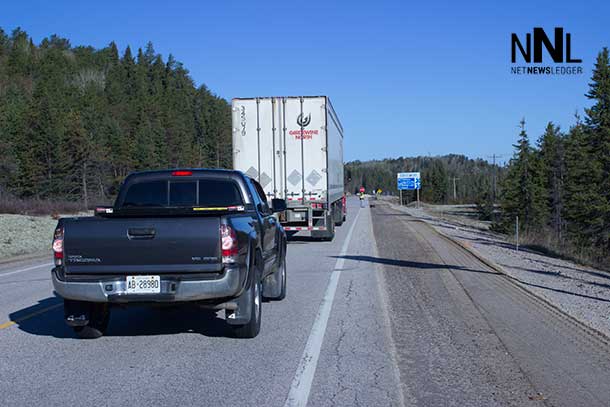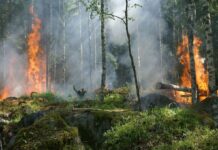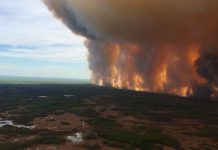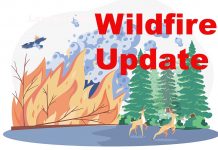THUNDER BAY – Weather has continued to assist firefighters in efforts to combat wildfires across the Northwest District of Ontario.
There were no new fires confirmed by the afternoon of June 1 in the Northwest Region.
The fire hazard is low across the region.
- Red 3 is being held – fire fighters have made significant progress in containing the East and southerly flanks to limit the spread into Red Lake and Kenora districts. Large portions of the fire are being monitored. The fire is showing minimal fire behaviour.
- Nipigon 15 about 11 kilometers East of Lansdowne House in the far north is under control at 145 hectares. It is receiving a modified response where firefighters are placed in strategic locations on the fire.
- Nipigon 13 near the Geraldton airport is under control.
- Thunder Bay 19 is listed as under control, and fire fighters continue to extinguish areas in the interior of the fire.
- Kenora 18 is under control and is in the process of demobilizing resources.
- Nipigon 14 has been declared out at 12 hectares in size.
A Restricted Fire Zone that has been in place across Northwestern Ontario, except the far north, has been lifted effective 06:00 p.m. May 30.
- The cooperation of people during this extended fire restriction has helped the Aviation, Forest Fire and Emergency Services program deal with major wildland fires that threatened people, property and industry.
- During the fire restriction a number of people did violate the Restricted Fire Zone and as a result have received warnings and fines.
- Outdoor fires are now allowed but people are urged to use caution.
- There is no daytime burning of brush or grass.
- Check out ontario.ca/fireprevention for guidelines on safe outdoor fire management.
- If you live in an organized municipality, check with local officials about bylaws on burning
Out of Province
Ontario provides firefighting resources outside of the province, and when needed brings in resources from other provinces, the territories or the United States.
- 131 fire response personnel are in Ontario supporting the firefighting effort. They are from British Columbia, Newfoundland and Wisconsin
- Two flight coordinators from Ontario have been deployed to the Canadian Interagency Forest Fire Centre in Winnipeg to assist in coordinating national aircraft for interprovincial / international movements of firefighting staff.
- Ontario has 85 personnel deployed to Alberta
Use of Unmanned Aerial Vehicles around Forest Fires
In Canada, the official designation for unmanned aircraft is Unmanned Aerial Vehicles (UAV’s) however Remotely Piloted Aircraft (RPA), drones, etc. were used in the past, now collectively these designations are classified as UAV’s. The actual flying aircraft may still be called UAV, ROA, RPA, drone, etc. by the general public, operators and users.
With more and more people flying UAV’s commercially or simply for the fun of flying, the exposure to possible airspace incursions involving an UAV have increased.
We would like to remind the public that flying UAV’s around forest fires is both dangerous and illegal. When you fly a UAV or drone near a forest fire you can put the lives of pilots, firefighters and other emergency workers at risk. The delays and distractions associated with having one of these aircraft in the area could also put the lives of the public and the safety of their homes at risk when a forest fire is being actioned. Always think safety first and keep your UAV or drone away from forest fires.
The following are the airspace restrictions for all aircraft over forest fires.
Forest Fire Aircraft Operating Restrictions
601.15 No person shall operate an aircraft
- (a)over a forest fire area, or over any area that is located within five nautical miles of a forest fire area, at an altitude of less than 3,000 feet AGL; or
- (b)in any airspace that is described in a NOTAM issued pursuant to section 601.16.
Transport Canada is responsible regulating the use of UAV’s and keeping the public and our airspace safe. If an incident is reported to the department, one of Transport Canada’s inspectors will verify that the operator followed the rules and whether the UAV safety guidelines were followed and fines could be as much as 25,000 dollars or imprisonment. Local police may also be involved if other laws were broken, including the Criminal Code and privacy laws.
Safe operation of UAVs information can be found on Transport Canada’s Website.
Aircraft flight restrictions over Red Lake fire
There is a Notice to Airmen (NOTAM) advisory in place for Red Lake District Fire Number 003 regarding flight operations over the fires, including the Woodland Caribou Provincial Park area west of Red Lake.
Pilots can access the information for the Red Lake advisories here . Aircraft requiring authorization to enter or depart the NOTAM area can contact the following: Red Lake Fire Management Headquarters – 807-727-2055 Firefighting aircraft are using and monitoring VHF-AM Frequency 122.40 within both restricted flight areas.
For more information about the current fire situation, and the active fires map go to ontario.ca/forestfire
The Northwest Region Fire Information Hotline is available for general information updates – 1-888-258-8842
Report forest fires by calling 310-FIRE (3473).






